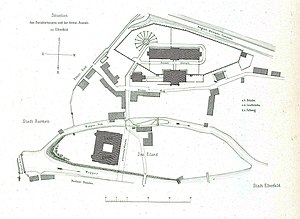Prison Wuppertal (Bendahl)
 Sketch of the situation of the prison and district court (1852) |
|
| Information about the institution | |
|---|---|
| Surname | Wuppertal correctional facility |
The Wuppertal correctional facility , formerly also the Bendahl police prison , was a correctional facility (JVA) in the Elberfeld district of Wuppertal .
history
From the beginning of the 19th century, the population of the two cities of Elberfeld and Barmen on the Wupper increased rapidly due to the strong onset of industrialization . Crime rose to the same extent , so that the dungeons in town halls were soon no longer sufficient. In 1834 the royal Prussian district court of Elberfeld was founded, which was responsible for an extensive area beyond the city limits. To support the regional court , two detention houses were set up in the old Elberfeld town hall (today the Von der Heydt Museum ) and in another municipal building , but they soon became too small.
In 1852 the district court moved into a new building on the island of Justice . Compared to the court of the Wupper in the hall in 1863 on the other side Bendahl on the tracks of the main line of the Bergisch railway company to build a prison started its first prison house was completed in 1864 and in 1871 and 1879 for a further detention house was expanded.
The 550 prisoners conceived and up overcrowded to 650 prisoners prison housed 1,918 mainly remand prisoners and convicts from the Rhine district and inmates with sentences ranging from six months to one year from the regional court districts Arnsberg and Hagen and Jewish women with sentences of three months and above from the Westphalian district courts.
Executions were carried out in the prison on Bendahl until 1912 , the delinquents were beheaded with a guillotine . The fact that the district court imposing the death sentences was separated from the place of execution in the prison yard by a Wupper arm led to a macabre interpretation of the saying “go over the Wupper… ” analogous to “go over the Jordan… ” for dying.
Even after the two major cities of Barmen and Elberfeld merged to form Wuppertal, the prison was used extensively. For a year around 109 members of the Belgian resistance group De Zwarte Hand were held in solitary confinement here. Shortly before the end of the Third Reich , political prisoners were taken out of prison by the SS , Gestapo and police and shot in the Wenzelnberg Gorge near Solingen (see final phase crime # Wenzelnberg Gorge in Langenfeld ).
The sanitary facilities remained at the level of the 19th century until 1968. There were no toilets in the cells, only buckets that were emptied in the morning by the detained prisoners. The building was hopelessly outdated and the cells chronically overcrowded. In 1967 all female inmates were transferred to the Solingen branch and later to the Cologne penal institution . The remaining male prisoners were held in pre- trial detention, civil detention , extradition detention , transit detention and deportation detention . Of the 364 detention places, 70 were reserved for young prisoners on remand.
The outdated prison, now due to the growing up of residential areas and main traffic axes in inner-city locations, had no future. With the correctional facility at Simonshöfchen, Wuppertal got a new and modern penal institution in Vohwinkel , which was opened on April 14, 1980. One day before the prisoners were transferred to the new (and much safer) institution, the most spectacular outbreak took place in Bendahl prison: accomplices , including the mafia killer Giorgio Basile as an escape car driver, blew up a small outer door in the wall and freed the imprisoned Wuppertal governor of the 'Ndrangheta and local mafia boss Arcangelo Maglio (called " Archangel ") and four other inmates. Two escapes were caught within a few weeks in the course of the manhunt.
The building was empty until 1997. The US trading group Wal-Mart decided to set up its German headquarters on the site, whereupon the building was demolished. In addition to the administration building, a consumer electronics store was located on the site.
The prison was popularly called Bad Bendahlo by the inmates . This corruption has its origin in a nearby outdoor pool on the Bendahler Bach , the Bad Bendahl , which enjoyed great popularity until it was closed in the middle of the 20th century.
Known inmates
- Jürgen Bartsch (1946–1976)
- Hans Carls (1886–1952)
- Victor Dillard (1897–1945)
- Otto Funke (1915–1997)
- Maria Husemann (1892–1975)
- Karl Schwesig (1898–1955)
- Friedrich Suhr (1907-1946)
- Husch Husch (1886–1953)
See also
Web links
- Historical data and images. Wuppertal-Vohwinkel correctional facility, accessed on April 6, 2017 .
- Enforcement plan for the state of North Rhine-Westphalia. Ministry of Justice of North Rhine-Westphalia, September 13, 2013, accessed on March 7, 2016 .
- WDR local time ( memento from September 29, 2007 in the Internet Archive )
Individual evidence
- ↑ Mirko Crabus: De Zwarte hand. Heimatverein Lingen, accessed on April 12, 2020 .
- ↑ Tekst voorde toespraak called de Zwarte Hand op de Herdenking van 71 jaar Bevrijding van Wuppertal 15 april 2016 Programma Herdenking. In: npdata.be. April 15, 2016, accessed April 13, 2020 (Dutch).
- ^ TV documentary: The godfathers of the Ruhr - Mafia paradise Germany ; Director: Klaus Fiedler; 2018
Coordinates: 51 ° 15 ′ 22 " N , 7 ° 9 ′ 44" E
